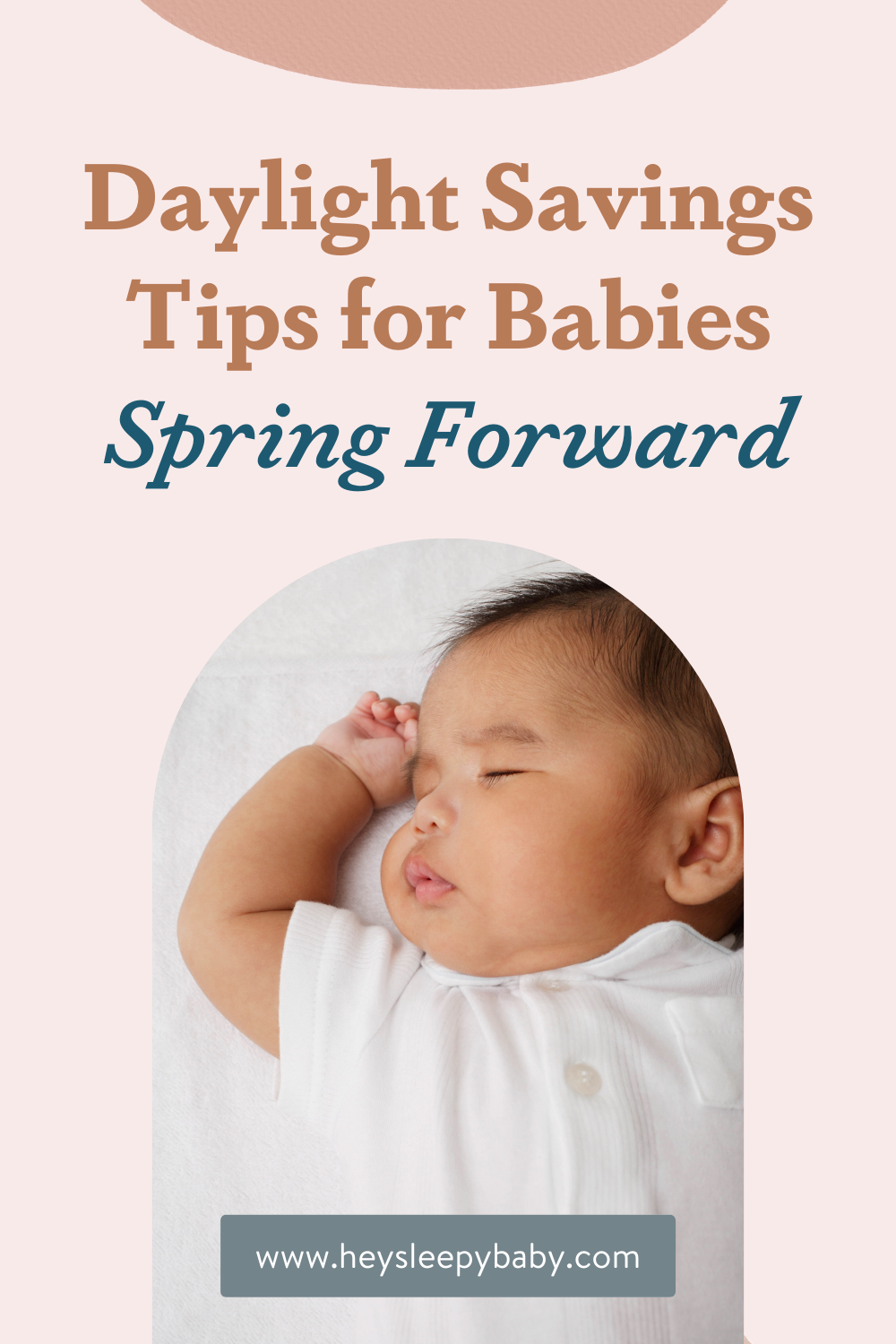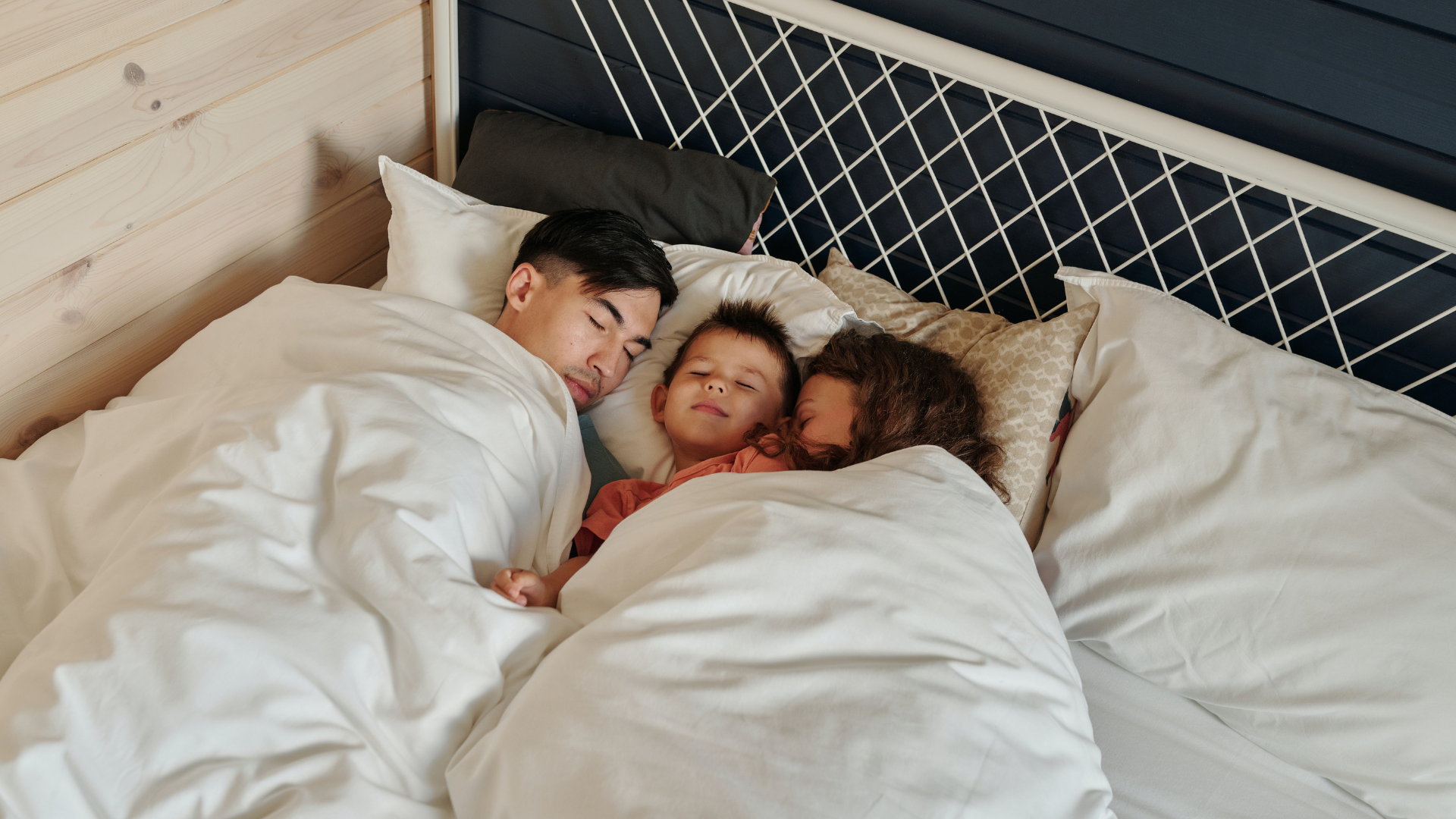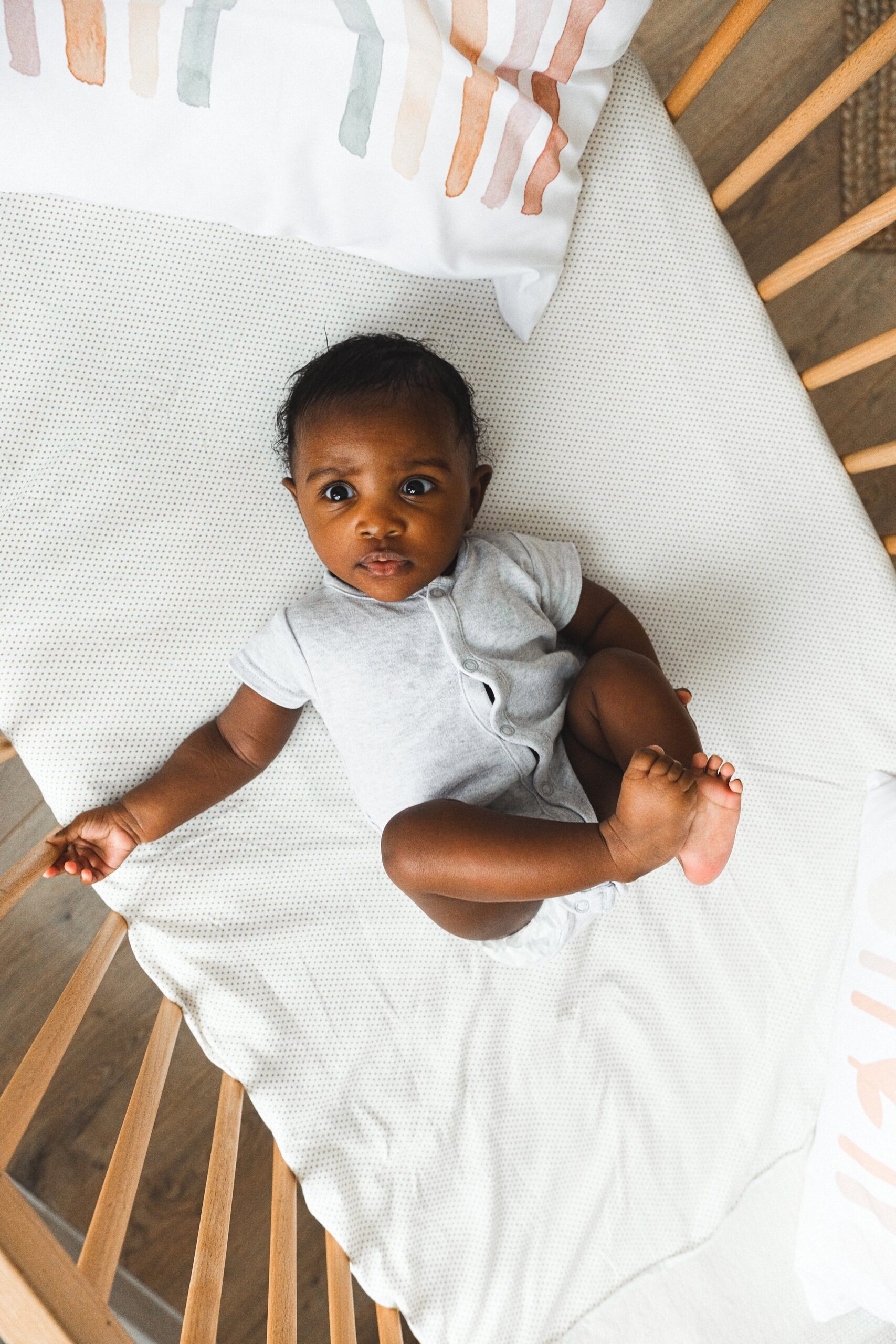I'm Rachael
Mom of 3 & Baby Sleep Expert with Big Sis Energy
& I’VE DONE ALL THE RESEARCH FOR YOU ALREADY.
Better sleep for the entire family
BROWSE COURSES
hey!
daylight saving time tips for babies- spring forward
Daylight Saving Time (DST) is coming up!
This is a seasonal time change of moving the clocks forward one hour in the summer months and changing them back again during the fall. This year, Daylight Saving Time begins on Sunday, March 10, 2024, at 2:00 A.M. On Saturday night, clocks are set forward 1 hour (i.e., losing one hour) to “spring forward”.
What is Daylight Saving time and when is it happening?
Daylight Saving Time (DST) is coming up! This is a seasonal time change of moving the clocks forward one hour in the summer months and changing them back again during the fall. This year, Daylight Saving Time begins on Sunday, March 10, 2024, at 2:00 A.M. On Saturday night, clocks are set forward 1 hour (i.e., losing one hour) to “spring forward.
What Does This Mean For Baby Sleep?
This is the clock change where we technically lose an hour of sleep, which can be brutal for anyone, but especially sleep-deprived new parents! In the infant sleep world, the expectation of this upcoming change often coincides with mass hysteria about how to cope with baby sleep and daylight saving time and people panic, frantically searching ‘surviving daylight saving with a baby and how to cope with baby sleep and clocks springing forward’. It sounds like torture for parents to lose a precious hour of sleep when they are already coping with so little! So how do you adjust your routine to account for this lost hour? These are my top tips to reassure you and to inform you about what to expect with your baby’s sleep and daylight savings and some practical tweaks, adjustments, and strategies you can utilize to make the change as smooth as possible.
One potentially nice thing about this clock change is that for parents of perpetual early risers, that 5:00am wakeup will now be 6:00am. Sometimes this shift is enough to “reboot” your baby’s schedule and stop those super early morning wakings.
Strategies For Helping Your Baby Adjust To Daylight Savings Time
Gradually shift your schedule
If your routine at home is quite time pressured and you are worried about things taking longer than usual because of the change in times and the differing amounts of sleep pressure, gradually adjusting your schedule over a few weeks will allow you to make some changes in line with the time flexibility of your family life. This might be best for you if you have a baby between about 4-18 months old because they likely have multiple naps per day. This strategy also works well for any baby or child who is very sensitive to change. If your baby’s usual wake time is 6:30am, you may want to wake them a bit earlier each day in the days leading up to the change. You can do 10-15-minute increments every couple of days for up to a week before March 12th. This way once the clocks “spring forward” your baby will already be used to the new (earlier) time. Because you’re shifting their morning earlier, naps and bedtime will likely follow, and be earlier as well. If you are the parent of a highly sensitive baby this might be the best option. You can prepare a few weeks beforehand and adjust by just five to ten minutes each time.

Move your schedule quickly
This is best for those parents who are saying “Oh Sh*t- daylight savings is this weekend!” If you forgot and read the above strategy and started to panic, not to worry. You can still implement some sleep routine changes just with a little bit more speed. You could shift your schedule earlier by about 20-30 minutes the day before the change. Then on Sunday morning, wake the baby another 20-30 minutes earlier. Your clocks will say 6:30am, but it will REALLY feel like 7:30am.
Do nothing (really- it’s ok!)
That’s right! You actually don’t need to stress about daylight savings as much as you may think. This change tends to be a little easier for babies to cope with than the one in the Fall. This is especially true if you have a newborn, who isn’t on much of a schedule yet anyway, or a toddler, who is a bit more adaptable, just letting it ride is probably the easiest way to deal with the time change. Let your baby wake up at their normal time on Sunday, continue your day with your regular nap and bedtimes, and they should be adjusted in a few days.
You might notice that they are a bit more tired than usual if they woke up at their normal time (since they “lost” an hour of sleep overnight) and if that’s the case you can bring bedtime up a bit earlier. Otherwise, enjoy the later mornings while they last! Being a bit looser with your routine at bedtime, reading a few more stories, or singing a few more songs, can help with the initial few days of an earlier bedtime. It keeps everything the same but just means you take the elongated bedtime routine and not the express version we all have to cram in some nights. Over the course of 3-5 days their body should catch up and you’ll be back on “schedule.”
Accepting the later bedtime
Following on from doing nothing is also rolling with the “new” bedtime. Some families prefer in the summer months to have a schedule that has a slightly later bedtime. As the evenings get lighter it can be nice to have a little bit more time and space in the evenings to play outside, meet up with friends, etc. Allow your baby to wake up at their normal time which would have been 6:30am and is now reading as 7:30am on your clock. They’ll go to bed when the clock reads 8:00pm which would have been 7:00pm etc. Shift naps an hour later than they would have been the day before and roll with the new schedule until it’s time to change the clocks again in the Fall!
Other Things To Keep In Mind When Preparing For Daylight Savings
It will be much lighter in the evenings. Sunset now won’t be until about 7pm and will continue to get later until summertime. This means that the bedroom might not be dark at your baby’s bedtime. Here are a few tips for making it through bedtimes in the Spring and Summer without a hitch:

-
Stick to your routine. Be super consistent. Your kids might notice it’s a little lighter around dinner time- which can feel different- so it’s really important to keep everything else the same.
-
Natural Sunlight in the morning helps the body clock adjust. Be sure to expose your child to natural sunlight in the morning as early as you can after they wake up and throughout the day to help the circadian rhythm catch up to the new time. Similarly, dim the lights in your home at least an hour leading up to bedtime to help stimulate the release of melatonin, the hormone that helps them to feel sleepy. In this adjustment period try and reduce screen time in the hours before bed because this can hinder the release of the hormone.
-
Keep things dim & dark in the evening. The best, easiest way to ensure your evenings remain unbothered by the time change is to make sure your child’s sleep space is super dark. When the sun sets our bodies naturally start to produce melatonin. When the sun sets later, this can pose a bit of a problem if we’ve got little kids to get to bed. So you can try dimming the artificial lighting in your home a couple of hours before bedtime (you probably don’t need it anyway!) and limit screen time in the afternoons.
-
You also want to invest in room darkening for your child’s sleep space itself, and the best product (IMO) is the Sleepout Curtain! It blocks 100% of all light and now comes in the tried-and-true travel option PLUS a more permanent curtain & rod set to give the nursery that polished look. Sleepout’s blackout curtains have my stamp of approval because not only are they all made with Certified thermal-insulating 100% blackout fabric but they are OEKO-TEX®, SGS®, and Greenguard® certified quality. With my 10% off discount code HEYSLEEPYBABY you can get your curtains from Sleepout just in time for Daylight Savings!
-
Stick to the same wakeup time. “Springing forward” can be tough because we are losing that hour of sleep on Sunday. Even if your little ones seem like they might sleep in, you will want to wake them at the normal time to stay on schedule. This will avoid setting yourself up for a day that feels VERY long- unless you don’t mind getting into a later to bed, later to rise routine.
-
Be flexible and patient! Some children do struggle a bit with the change and it can feel a bit like jet lag. There may be some grumpiness, fussiness, and tiredness but the good news is research has shown it takes about a week for the circadian rhythm to adjust to the change!
My Preferred Approach
Personally, as a family, we usually go with the “do nothing” approach in our house. If our kids seem extra tired we have a chill day and put them to bed a little bit earlier, and we just prepare for a wonky week. It doesn’t have to be such a big deal; going with the flow and having realistic expectations are key when you have a baby!
Was This Helpful? Save It For Later!

binge reads
We think you'll love these
You deserve to the
baby stage, not just "survive it."
And you DON'T have to sacrifice your values, ignore your instincts, or force yourself to follow a method you don't align with just to get your baby back to sleep.
I’m here to help you create a restful, sustainable sleep environment that honors both your baby’s needs AND your own (without the stress OR the guilt!) because, no, you don’t have to choose between the two.
enjoy!
BABY SLEEP COURSES →
BABY SLEEP CONSULTS →
Wish you could help your baby sleep better without resorting to sleep training? Download my FREE guide to a good night’s sleep and learn 8 simple, science-backed tips for supporting your child’s needs.
Traditional sleep training methods don’t have to be your solution to better sleep.
SLEEP TRAINING ISN’T THE ONLY WAY TO GET GOOD SLEEP
Hey, I'm Rachael and Hey, Sleepy Baby is for parents who want to get their nights back, without sleep training their babies.
NO ONE TOLD US POD
explorING the untold truths of parenting





